Top Regional Property Management Companies by Unit Count (2025)

Regional property management companies are leading the multifamily housing market in 2025 with their deep local expertise and ability to adapt quickly. Here's a quick summary of the top players:
- RangeWater Real Estate: 97,072 units across 13 states, focusing on multifamily, single-family rentals, and Build-to-Rent (BTR).
- Morgan Properties: Over 100,000 units in 22 states, driven by strategic acquisitions like the Trilogy portfolio.
- RPM Living: 226,169 units in 45 submarkets, with recent expansions in Nashville and Las Vegas.
- FPI Management: 167,767 units in 23 states, with a strong focus on affordable housing.
- ZRS Management: 35,000+ units across eight states, specializing in Class A and B properties.
- Village Green: 50,000 units in 20+ states, leveraging over a century of experience.
- Marquette Management: 16,000 units, focusing on Midwest and Southern markets with value-add investments.
- Bozzuto: 120,000 apartments and 3.7M sq. ft. of retail space, with a strong East Coast presence.
Quick Comparison
| Company | Unit Count | States Covered | Focus Areas |
|---|---|---|---|
| RangeWater Real Estate | 97,072 | 13 | Multifamily, Single-Family, BTR |
| Morgan Properties | 100,000+ | 22 | Strategic Acquisitions |
| RPM Living | 226,169 | 30+ | Diverse Portfolio, Marketing Focus |
| FPI Management | 167,767 | 23 | Affordable Housing |
| ZRS Management | 35,000+ | 8 | Class A & B Properties |
| Village Green | 50,000 | 20+ | Mixed-Use, Long History |
| Marquette Management | 16,000 | 8 | Value-Add Investments |
| Bozzuto | 120,000 | 20 | East Coast, Retail Integration |
Regional firms excel with localized decision-making, strong vendor networks, and tailored strategies, making them key players in the multifamily housing market.
The 20 Largest Property Management Companies
1. RangeWater Real Estate
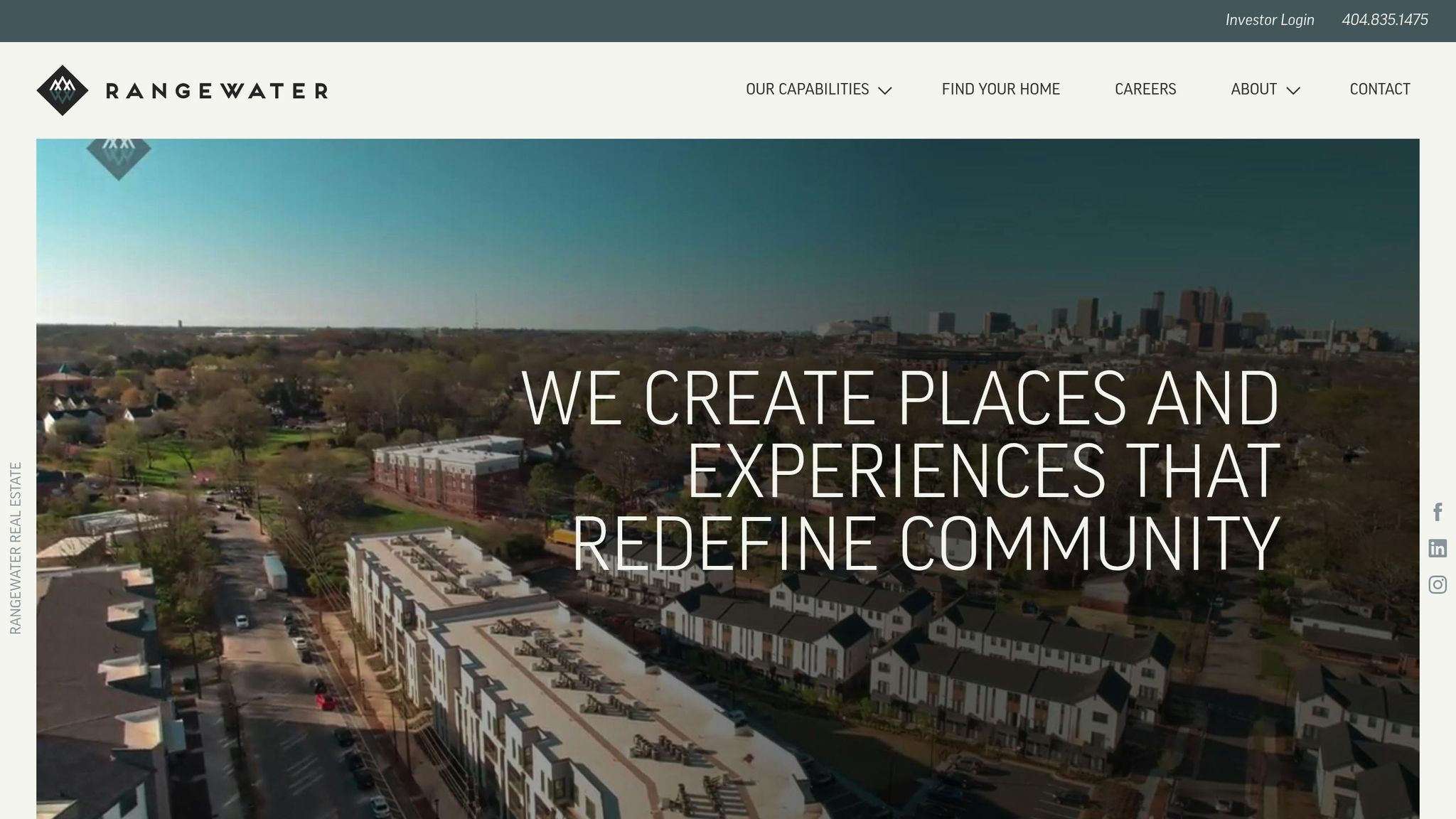
RangeWater Real Estate has established itself as a leader in regional property management, overseeing 97,072 units across 13 states as of May 2025 - an impressive increase from 78,380 units in 2022 [4]. With a strong presence in the Sun Belt and Mountain West regions, the company operates key offices in Atlanta, Dallas, Denver, and Tampa, with Georgia and Florida serving as its core markets [5]. Since its founding in 2006, RangeWater has developed or acquired nearly 37,000 rental housing units, valued at over $7.2 billion [3]. Below is a snapshot of their diverse portfolio:
| Portfolio Component | Unit Count | Coverage |
|---|---|---|
| Multifamily Units | 72,000+ | 13 states |
| Single-Family Rentals | 15,000+ | 114 neighborhoods |
| Build-to-Rent (BTR) | 2,200+ | Sun Belt & Mountain West |
Their Storia build-to-rent (BTR) brand, launched in 2020, has grown rapidly and now accounts for 15% of their managed portfolio [5].
Rob Sucher, Managing Director of Development for RangeWater, highlighted their commitment to community-focused growth:
"We are proud to partner with the city to bring their vision for Old Town to life, providing new housing and amenities that enhance the community's appeal for both residents and businesses", said Sucher [6].
In early 2025, the company acquired four acres in Lilburn, Georgia, for a 269-unit community development, with completion anticipated in late 2026 [6][3].
RangeWater’s approach combines property management expertise with in-depth market research, operations reporting, and strategic vendor partnerships. This strategy has earned them prestigious industry awards, including NAHB Developer of the Year (2015, 2021) and NMHC Top Developer (2020, 2023) [7][3].
2. Morgan Properties
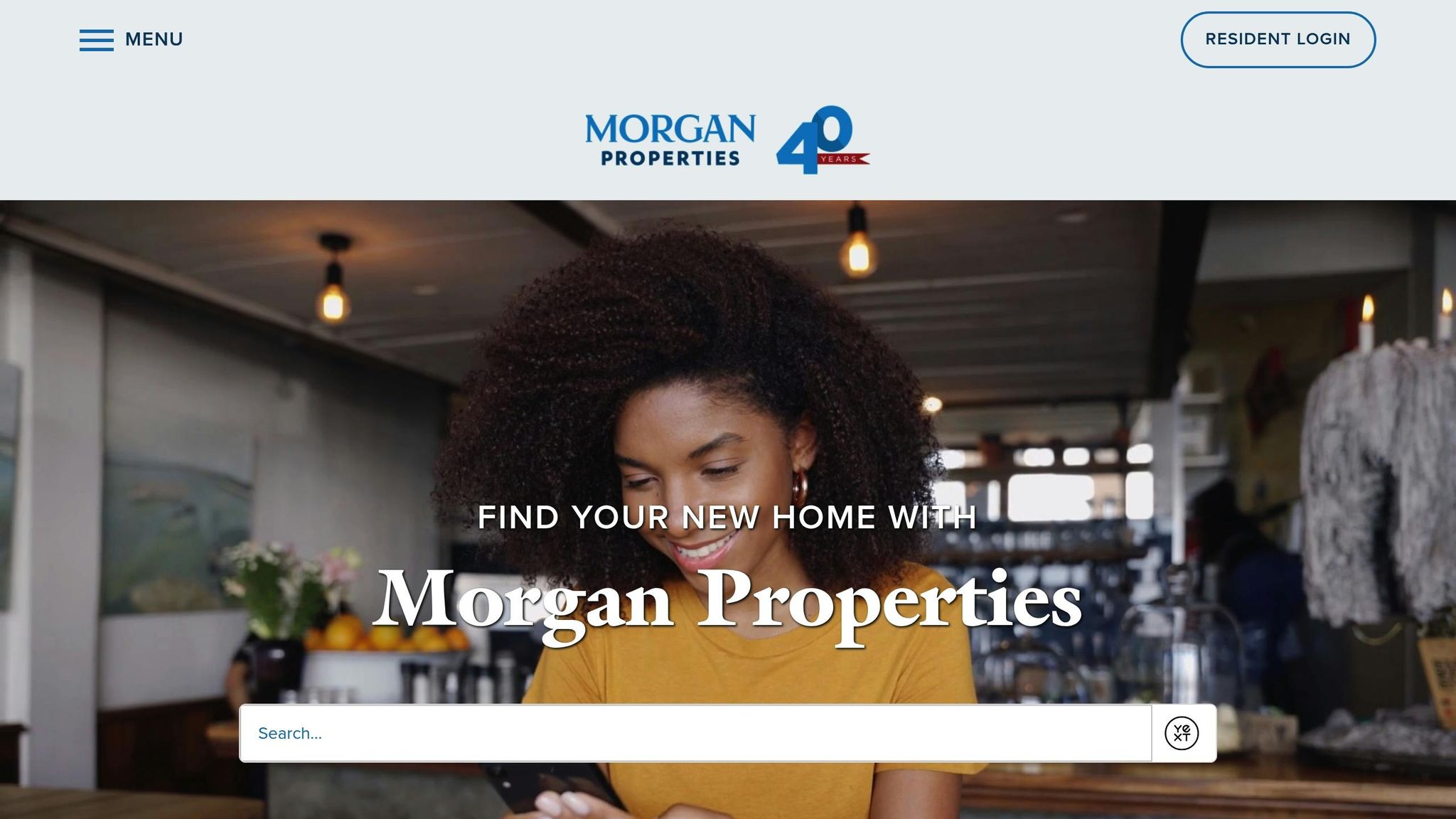
Morgan Properties oversees more than 100,000 units across 360 communities in 22 states as of May 2025 [8][9]. This growth has been fueled by strategic acquisitions that have significantly expanded the company's regional footprint.
| Region | Highlights |
|---|---|
| Mid-Atlantic & Northeast | Core foundation markets |
| Midwest | 14,500 units |
| Sun Belt | Rapid growth |
A standout moment in their expansion was the Trilogy portfolio acquisition in April 2025. This $501 million deal added 3,054 units across eight Midwest states, boosting their presence in the region from just 793 units in 2019 to over 14,500 today [8]. Additionally, the Keystone acquisition in July 2024 brought 11 properties and more than 3,400 units in Pennsylvania into their portfolio [9].
Co-presidents Jonathan and Jason Morgan reflected on this milestone:
"Surpassing 100,000 units is a defining moment and a testament to the hard work and dedication of our entire organization, who have helped shape Morgan Properties into a best-in-class multifamily owner and operator" [10][11].
Morgan Properties' portfolio now includes:
- 282 corporate communities
- 28 student housing communities
- Management of over 800 properties for more than 100 investors [13][14]
Their competitive edge is rooted in their ability to navigate complex deals and their extensive market presence. Speaking about their Midwest expansion, leadership explained:
"As a national multifamily investment firm with an existing presence in six of those states, we had a strategic advantage over competitors, many of whom were only bidding on a handful of properties rather than the full portfolio. The deal also involved complex financing, requiring both the assumption of existing Fannie Mae debt and the arrangement of new financing" [9].
Morgan Properties also demonstrates operational excellence through tools and partnerships. They use Buildium software for real-time financial reporting, offer flexible contractor arrangements, and bring specialized expertise in HUD/Section 8 programs [14]. Their collaboration with Jetty has further improved access to affordable renting options for residents [12]. These efforts, combined with their strategic growth, reinforce Morgan Properties' standing as a leader in regional property management.
3. RPM Living
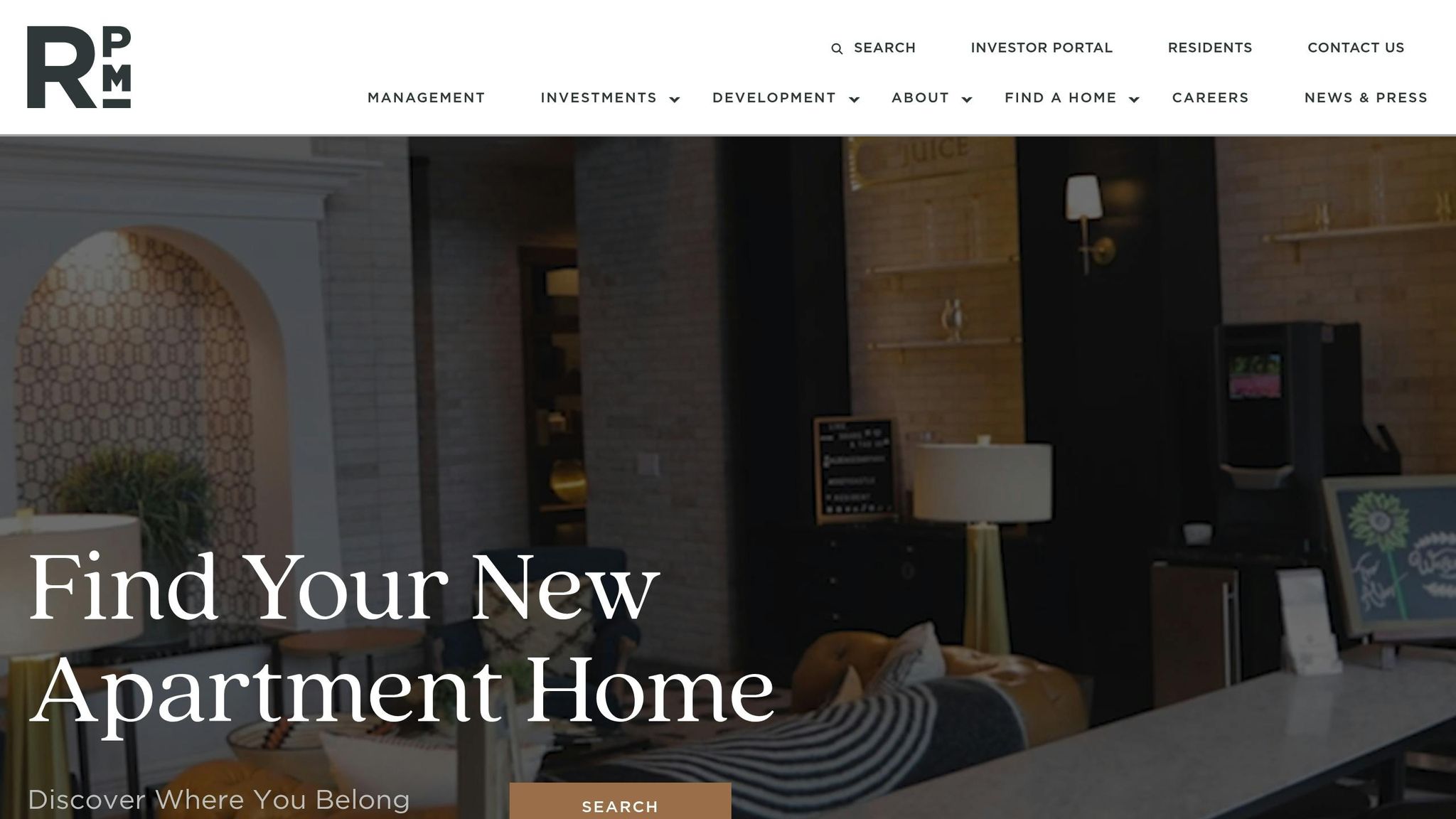
RPM Living ranks as the third-largest regional property management company, managing an impressive 226,169 units across more than 45 submarkets [16]. Since its humble beginnings in 2002 with just 10 units, the company has grown at a remarkable pace [17].
In February 2024, RPM Living made a bold move by entering two significant markets:
| Market | Properties | Units | New Office Location |
|---|---|---|---|
| Nashville | 29 | 6,000+ | 1222 Demonbreun Street |
| Las Vegas | 24 | 5,424 | 9075 West Diablo Dr., Suite 130 |
These expansions represent a strategic shift in the company's regional approach. CEO Jason Berkowitz shared his enthusiasm for these developments:
"Expanding our footprint allows us to stay ahead of the competition. We see a lot of opportunity for growth in Las Vegas and Nashville and both will be key markets of focus for us heading into 2024" [18].
RPM Living’s portfolio spans conventional, senior, and affordable properties [16]. The company employs more than 4,600 professionals across nine regions, maintaining a hands-on management style that emphasizes both property performance and resident satisfaction [16].
Their in-house marketing team, consisting of over 27 experts, has achieved impressive results: reducing cost per lead by 183% and boosting click-through rates by 102% [19]. CEO Jason Berkowitz credits this success to their forward-thinking approach:
"What drives our company is a constant focus on best practice, business objectives and our team members; making sure we're never complacent and not doing things just because it's how they've always been done" [16].
RPM Living’s growth is further highlighted by the scope of its operations, which extend across more than 30 states. Key statistics include:
- Over 180 client relationships
- 12 regional offices
- $3 billion in owned assets
- 4,500 associates nationwide [18]
In Texas alone, RPM Living manages 83 properties, encompassing over 25,000 units in Houston, with substantial operations in Austin, Dallas, and San Antonio [18]. This strong focus on localized market knowledge underscores the company’s dedication to delivering tailored solutions for each region.
4. FPI Management
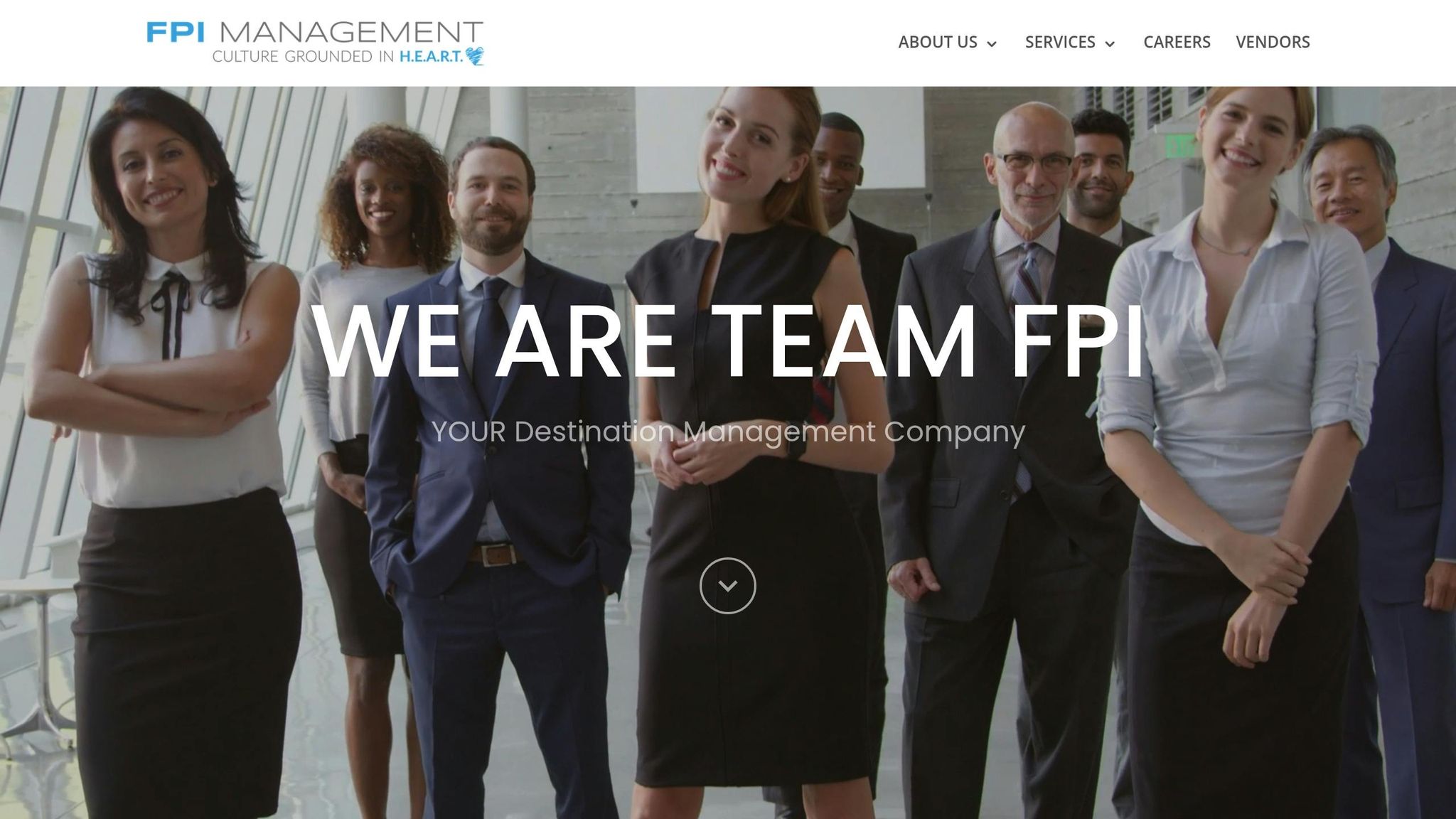
FPI Management stands out as a regional leader in property management, overseeing an impressive 167,767 units across 23 states as of 2025 [15]. With roots dating back to 1968, the company brings over 55 years of expertise to multifamily property management. Its extensive experience is reflected in a diverse portfolio that includes market rate, affordable, and specialized housing [21].
The company's portfolio is thoughtfully balanced between market rate and affordable housing units:
| Property Type | Unit Count | Percentage |
|---|---|---|
| Market Rate | 92,000 | 55% |
| Affordable | 74,179 | 45% |
FPI Management has a significant presence in key Western states, as shown below:
| Region | Total Units | Market Rate | Affordable |
|---|---|---|---|
| California | 90,255 | 59,812 | 30,443 |
| Nevada | 19,355 | 14,098 | 5,257 |
| Washington | 18,285 | 4,301 | 13,984 |
In 2024, FPI Management was selected by the Housing Authority of the City of Alameda to oversee new affordable developments under the North Housing Master Plan. This initiative will deliver over 100 affordable homes, further cementing the company’s commitment to accessible housing [24].
FPI Management operates on the principles of its H.E.A.R.T. culture - Humility, Excellence, Accountability, Respect, and Teamwork. Its portfolio spans various property types, including luxury, garden-style, student, senior housing, and single-family homes [20].
The company serves a wide range of clients, including institutional investors, international real estate firms, financial institutions, and government agencies [20]. Within the affordable housing sector, FPI Management has established itself as a leader, managing 54,475 housing credit units [25].
"At FPI Management, we believe that the health and well-being of our employees are fundamental to our success", says Martin Sadler, Chief Human Resources Officer [23].
This focus on employee well-being has contributed to steady growth, positioning FPI Management as the 4th largest among 340 active competitors [22]. With over 1,200 communities under its management [15], FPI Management’s diversified and effective approach continues to drive its success.
5. ZRS Management
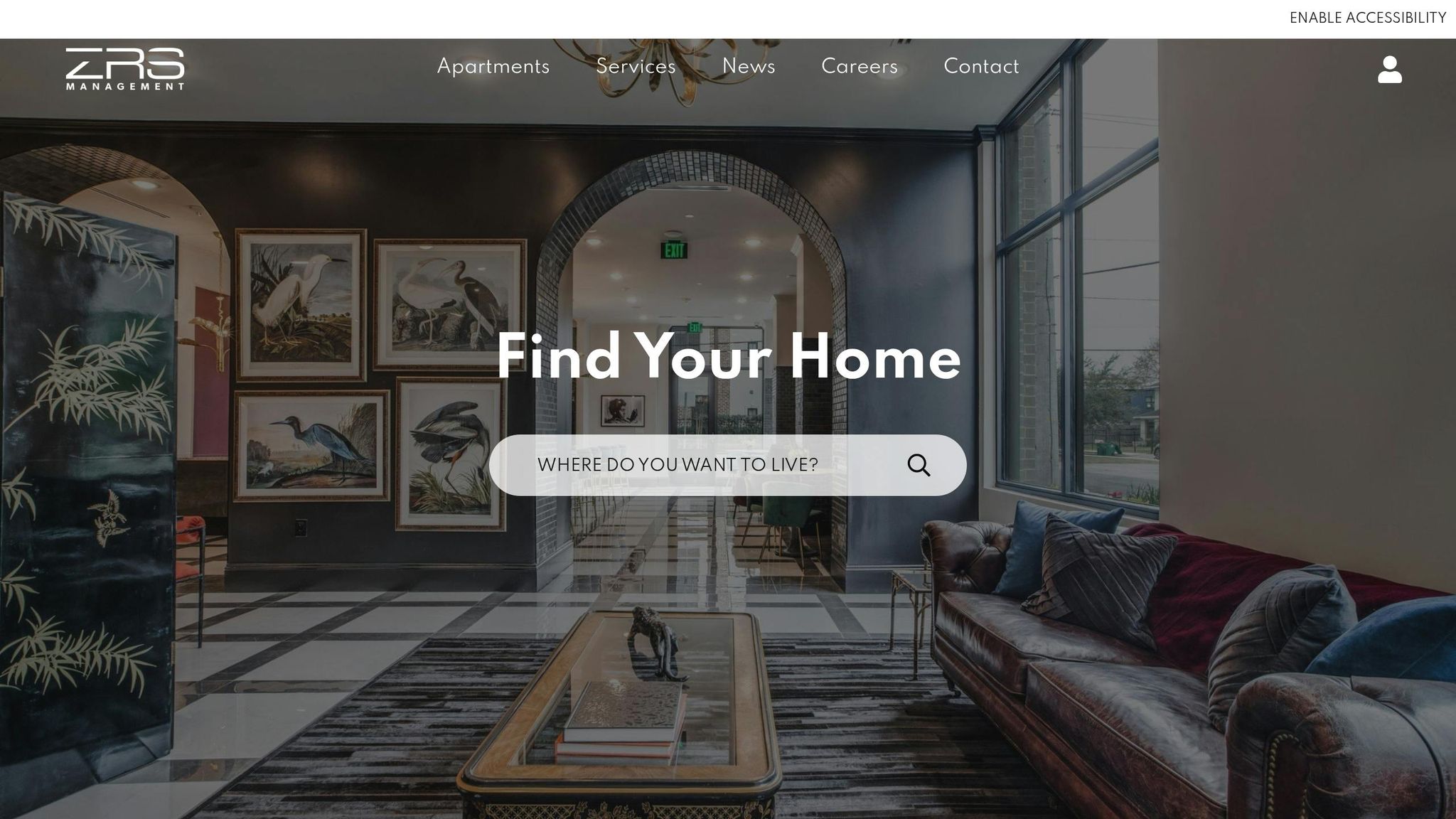
ZRS Management oversees more than 35,000 units as of 2025 [26]. Established in 1991 as ZOM Residential Services, Inc., the company transitioned in 2010 into an independent third-party management firm [26], positioning itself as a key player in the multifamily housing sector.
The company's reach extends across eight states, as outlined below:
| Region | States Served |
|---|---|
| Southeast | Florida, Georgia, South Carolina, North Carolina, Tennessee |
| Mid-Atlantic | Maryland, Virginia |
| Southwest | Texas |
This geographic footprint highlights ZRS Management's focus on delivering specialized services in select markets.
The company concentrates exclusively on Class A and B properties [28], showcasing expertise in areas such as:
- Luxury high-rise communities
- Garden-style apartments
- Urban mixed-use developments
- "Fractured" condominium projects
A standout feature of ZRS Management's approach is its strategic portfolio management. Each property manager oversees no more than six properties, a deliberate choice to ensure focused attention and quality service [27]. This contrasts with the industry standard of managing eight to ten properties per manager.
In terms of financial performance, ZRS Management's estimated annual revenue is $241.7 million [26]. Between 2024 and 2025, the company expanded its workforce by 8%, bringing the total to 1,151 employees [26].
"ZRS Management understands that our success is built from the success of our clients; therefore, we are committed to your asset as if it were our own." - ZRS Management [28]
The company offers a range of services, including:
- Acquisition assistance and due diligence
- Detailed unit-by-unit property inspections
- Comprehensive market surveys
- Cost analysis
- Branding consultation
ZRS Management has carved out a niche in the luxury high-rise market, managing 26 projects with over 7,000 units [27]. Their CPA-led accounting team ensures accurate and timely financial reporting [27], reflecting their commitment to precision and reliability. This operational approach aligns with their regional expertise, a key factor in their success within the multifamily housing industry in 2025.
This focused and meticulous management style sets ZRS Management apart from larger, national firms, as explored further in later comparisons.
6. Village Green
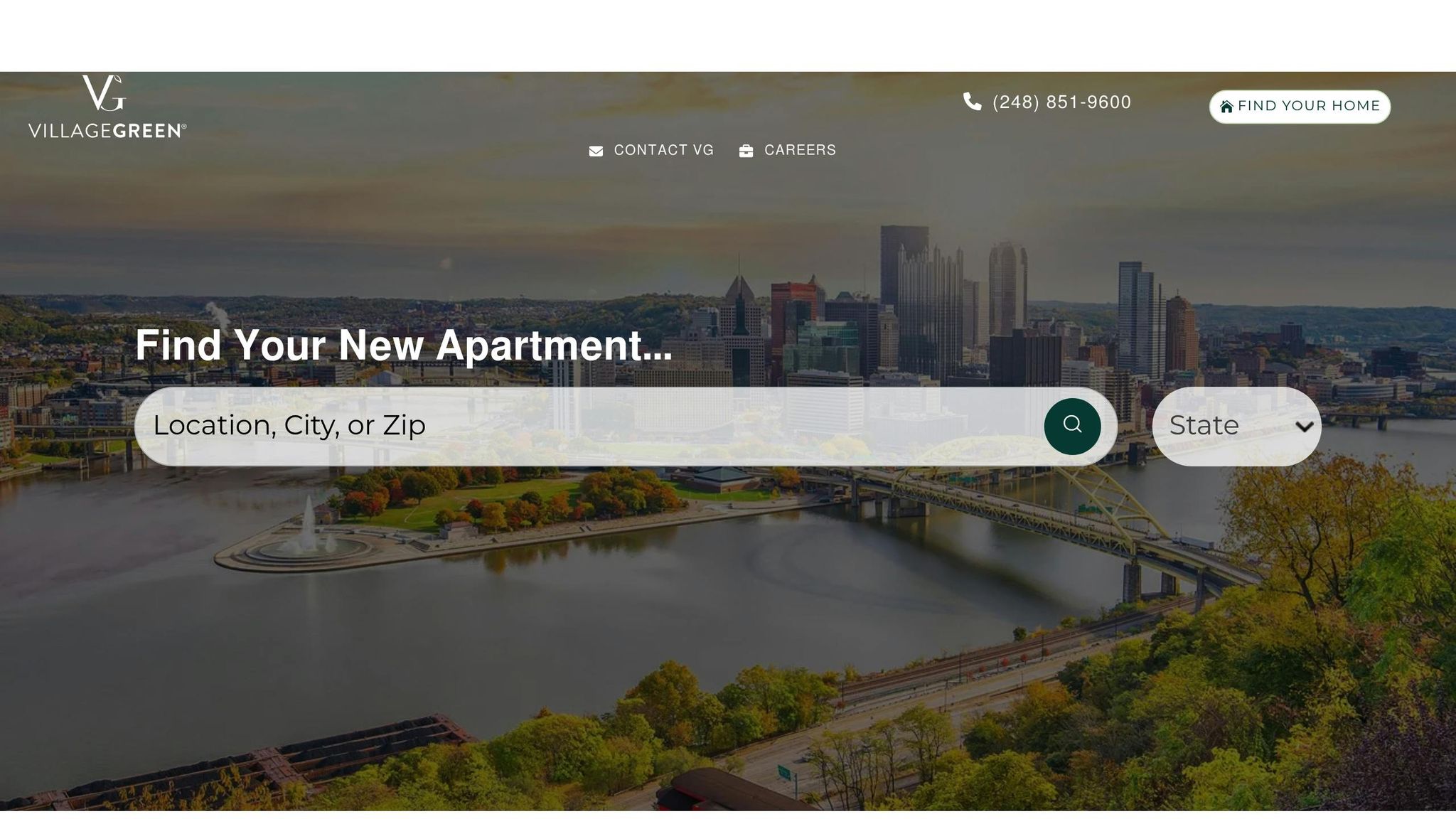
Village Green oversees around 50,000 apartment units spread across more than 20 states [32][31]. Established in 1919, the company brings over a century of experience to the multifamily housing industry [29].
Operating in 50 cities, Village Green's regional offices are strategically located in key areas:
| Region | Office Locations |
|---|---|
| Midwest | Detroit (HQ), Chicago, Cincinnati, Columbus, Minneapolis/St. Paul |
| South | Dallas |
Ranked #35 on the National Multifamily Housing Council's Top 50 Managers list for 2025 [33], Village Green employs 1,357 team members [30].
The company follows a vertically integrated model that emphasizes asset optimization, capital improvements, mixed-use property management, interior design, procurement, and business analytics. This structure provides the flexibility and localized focus that are hallmarks of top-performing regional property management companies in 2025.
Dedicated teams specializing in accounting, marketing, and operations ensure high-quality service across Village Green's varied portfolio of apartment communities and mixed-use properties. Their approach is firmly rooted in meeting client investment objectives through dependable property management practices.
7. Marquette Management
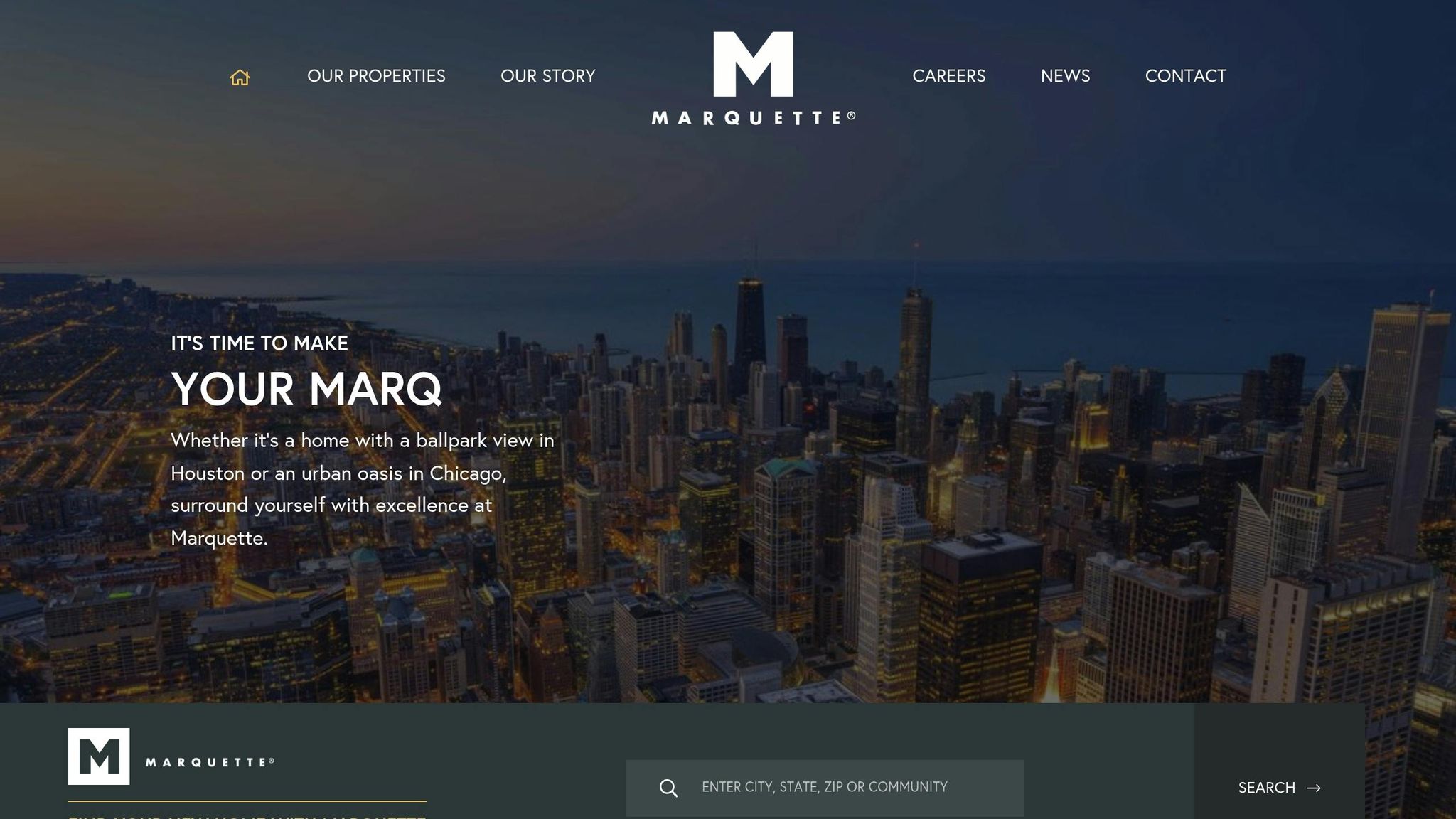
Marquette Management stands out as a regional powerhouse, managing over 16,000 units across the United States. With a portfolio valued at over $3.3 billion, their reach spans eight states, with a strong foothold in the Midwest and a growing presence in the South.
| Region | Primary Markets |
|---|---|
| Midwest | Illinois, Indiana, Michigan, Minnesota |
| South | Texas |
| Recent Expansion | Ohio |
This regional focus reflects the company’s deliberate approach to market selection. Guided by Lecia Anderson, Vice President of Operations, Marquette Management boasts a 40-year history, which includes the development of 6,552 apartment homes across 26 multifamily and mixed-use properties [34].
The company’s growth strategy revolves around targeted value-add investments in key areas. A prime example is the Water Street District in Naperville, completed in 2018. This development features an extended riverwalk, Hotel Indigo, retail spaces, and restaurants, showcasing Marquette’s ability to enhance local communities [37]. Their partnership with Orion Residential has further amplified their expansion efforts.
Nick Ryan, Marquette’s managing partner and founder, shares his vision:
"Bringing Orion into the fold of the Marquette business presents an exceptional opportunity for both firms and marks a significant step in accelerating Marquette's reach into markets in the Southeast and Southwest regions, like North Carolina, South Carolina, Georgia, Florida and Arizona." [35][36]
With a team of more than 300 employees nationwide [34], Marquette Management prioritizes operational excellence. Their deep understanding of local markets drives both growth and exceptional resident experiences. This approach has delivered impressive results, including a 21.8% Internal Rate of Return [34]. Recent expansions, such as the addition of 1,290 apartments across multiple properties in December 2023, further highlight their momentum [38].
Jim Cunningham, Chief Operating Officer, underscores their philosophy:
"In today's market, property owners are looking for management that excels as a steward of both the resident experience and the value of their investment, something Marquette Management has been known for throughout our multiple decades in business." [38]
8. Bozzuto
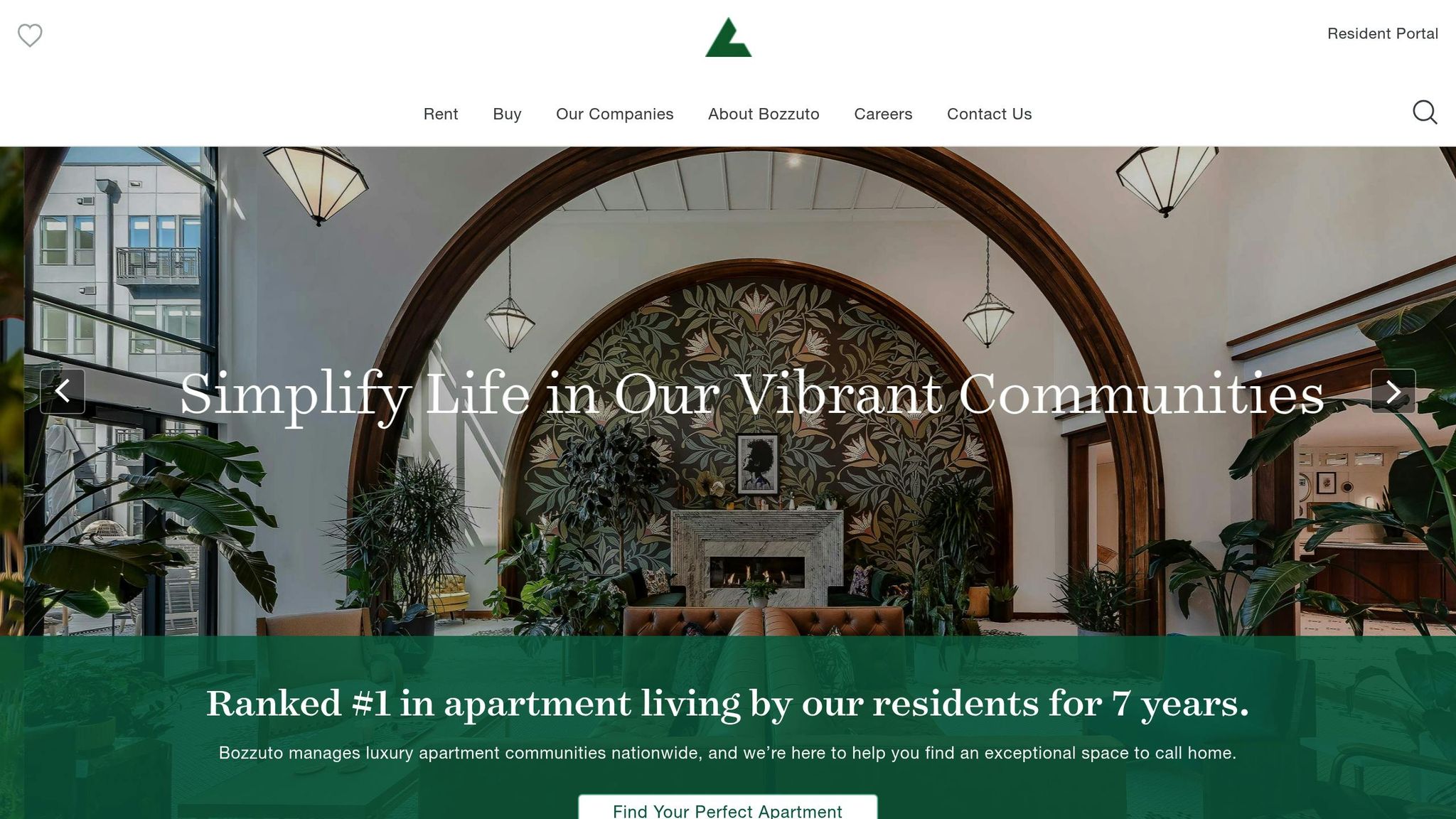
Bozzuto, like other regional firms reshaping multifamily housing in 2025, manages an impressive portfolio of 120,000 apartments and 3.7 million square feet of retail space [42]. With properties valued at $20.3 billion across 20 states [40], the company has a stronghold along the East Coast, stretching from Miami to Boston, while also maintaining operations nationwide [39]. Here’s a closer look at its market reach:
| Region | Markets Served |
|---|---|
| East Coast | Florida, Georgia, North Carolina, Virginia, Maryland, Delaware |
| Northeast | Massachusetts, Connecticut, New York, New Jersey, Pennsylvania |
| Midwest | Illinois, Minnesota, Wisconsin |
| West Coast | California, Washington |
| Other Regions | Colorado, Rhode Island, Tennessee, Washington, D.C. |
Bozzuto made its move into West Coast markets in 2020, focusing on California and Washington. By 2024, it had added over 27,000 units to its portfolio, with two-thirds of these additions stemming from existing client relationships [43].
Stephanie L. Williams, president of Bozzuto Management Company, highlights the company’s philosophy:
"Our growth is rooted in our commitment to being not the biggest, but the best. It's about values, not volume. We are strategic, focusing on entering markets with intention, deepening relationships, and delivering operational excellence." [43]
What makes Bozzuto stand out is its wide range of services, which include:
- Property management and leasing
- Maintenance and resident services
- Financial management
- Advisory services for design and branding
- Energy and water conservation programs [40]
Bozzuto’s regional leadership model plays a key role in scaling operations while maintaining quality. Williams elaborates:
"Our commitment to strategic investment in talent is especially evident in our regional leadership structure. In high-growth markets nationwide, we've established strong, empowered leadership teams that bring deep market knowledge, hands-on support, and a performance-driven mindset to every community. This structure allows us to scale while maintaining consistency, agility, and responsiveness at the local level." [43]
With a presence in both urban centers and suburban areas, Bozzuto focuses on elevating resident experiences and creating appealing communities [40]. This dedication has earned the company recognition as the #1 Property Management Company by Multifamily Executive Magazine and J Turner Research [41], achieving a companywide Online Reputation Assessment score of 84.23 [41]. Bozzuto’s emphasis on local expertise aligns with the broader discussion on the importance of regional vendor networks.
Regional vs. National Property Management: Key Differences
In 2025, regional property management firms stand out by leveraging their deep local expertise across various operational areas. This localized approach not only simplifies decision-making but also allows these firms to customize their services to meet the specific needs of their communities.
"Firms that are focused on a specific market are generally more tied to what makes that market tick. Their roots and experience in the community give them a solid understanding of the full real estate landscape and all the things that influence real estate dynamics and decision-makers." [2]
The differences between regional and national property management firms become especially clear when comparing their operations in these areas:
| Aspect | Regional Firms | National Firms |
|---|---|---|
| Decision Making | Quick, localized responses | Standardized processes with longer approval chains |
| Market Knowledge | Deep understanding of local dynamics | Broader market trends and research |
| Staff Management | Local teams with rapid hiring capability | Centralized HR with standardized procedures |
| Accounting | Local teams providing direct access | Centralized operations with potential delays |
| Investment Focus | Flexible investment thresholds | Often $10M+ minimum per asset [44] |
| Vendor Relations | Strong local network connections | Limited to internal vendor networks |
Regional firms excel in their ability to respond quickly and cost-effectively to the needs of property owners. For example, they often handle emergencies faster and keep overhead costs lower, which translates to more competitive pricing and personalized service [46]. Their agility also extends to technology, with 53% of firms adopting specialized software to enhance operations [45].
On the other hand, national firms bring strengths in scale and stability. Their expansive networks provide macro-level market insights and access to broader investment opportunities [2]. While they may lack the localized focus of their regional counterparts, their resources and standardized procedures offer consistency and reliability.
Regional firms’ competitive edge lies in their close ties to the communities they serve. Their knowledge of local zoning laws, rental rates, and property values allows them to develop tailored management strategies. This localized approach enables them to deliver effective property management services, even for smaller portfolios, making them a strong choice for property owners seeking a more personalized touch.
Local Vendor Networks and Market Success
Regional property management companies thrive on the strength of their local vendor relationships. These partnerships play a key role in improving property performance and streamlining operations. Below are some practical examples of how these connections translate into measurable results.
Quick Response During Emergencies
Take this scenario: a trusted vendor partnership allowed a plumber to address a critical boiler failure within 24 hours. The plumber provided a temporary fix immediately and completed a full replacement by the end of the week, ensuring residents stayed warm during winter [47].
Lower Costs Through Strong Partnerships
Established relationships with local vendors often lead to reduced costs. These vendors frequently offer preferential pricing and higher-quality service, which helps property managers keep expenses under control while maintaining a competitive edge in their markets.
Tailored Maintenance and Regional Expertise
Local vendors bring a wealth of specialized knowledge that directly benefits properties. From understanding weather-related challenges to navigating local building codes, these vendors help property managers plan proactive maintenance and prevent costly issues.
| Aspect | Benefit to Property Performance |
|---|---|
| Preventive Maintenance | Early detection and resolution of issues |
| Service Prioritization | Faster attention during busy seasons |
| Quality Consistency | Reliable work through long-term vendors |
| Cost Management | Better pricing for efficient operations |
These strategies not only boost operational efficiency but also enhance the competitive standing of regional property management companies.
Property managers who cultivate strong vendor relationships enjoy clear benefits, including:
- Faster response times during emergencies
- Reduced costs for services
- Consistent, high-quality work
- Lower vacancy rates due to timely repairs
- Improved tenant satisfaction through quick problem-solving
To fully capitalize on these advantages, successful managers prioritize open communication with vendors, ensure prompt payments, and schedule work ahead of time whenever possible [47]. This proactive approach strengthens vendor relationships and directly contributes to better property performance.
Conclusion
Regional property management companies are reshaping the multifamily housing landscape by leveraging strong local vendor networks and tailored strategies. The market for these firms is on track for substantial growth, projected to increase from $81.52 billion in 2025 to $98.88 billion by 2029 [49]. Their ability to combine local expertise with data-driven approaches and digital tools - such as online rent payments, preferred by 80% of tenants, and smart home features, favored by 54% [49] - gives them a distinct advantage.
This approach delivers measurable outcomes. Katrina Greene, Senior Regional Manager at Sheehan Property Management, highlights this balance:
"We use both the individual data and aggregate data to help us make sound decisions during the leasing process, but also to be sure we're catering to our current resident base as well" [48].
Several key trends reinforce the optimistic outlook for regional firms:
| Market Factor | Current Impact |
|---|---|
| Sustainability Demand | 74% of renters prioritize energy-efficient properties |
| Digital Adoption | 80% of apartment seekers begin their search online |
| Local Marketing ROI | 126% more traffic for businesses in the Google 3-Pack |
| Tenant Retention | Average turnover cost of $1,750 per unit |
By embracing technology and focusing on local market dynamics, regional firms are well-positioned to grow and maintain their competitive edge [50]. Donald Davidoff of Multifamily Executive underscores this shift:
"By collecting data on what has happened and reporting it in an easy-to-consume way, we can make intelligent, data-driven decisions instead of arguing over opinions" [1].
This combination of localized insights and digital innovation cements regional firms as key players in the evolving multifamily housing market.
FAQs
What makes regional property management companies better at decision-making and understanding local markets compared to national firms?
Regional property management companies stand out because they truly understand the communities they serve. Their in-depth knowledge of local markets means they can keep a close eye on trends, tenant preferences, and market changes. This allows them to adapt quickly and make informed decisions, often leading to better outcomes for property owners.
What also sets these firms apart is their direct, personal communication with decision-makers. Their smaller size makes it easier to build strong, one-on-one relationships with clients. This personalized approach ensures that property management strategies align closely with the specific needs of the area. Together, their local expertise and hands-on service make regional property management companies valuable allies in the multifamily housing industry.
How do local vendor networks help regional property management companies succeed?
Local vendor networks are crucial for regional property management companies, offering fast and dependable access to trusted service providers. This means property managers can address maintenance issues and emergencies promptly, minimizing disruptions and keeping tenants happy.
What’s more, local vendors often bring valuable insights into regional regulations and community-specific needs. This allows them to provide services that are not just efficient but also well-suited to the area. Building strong ties with these vendors does more than ensure consistent service - it supports the local economy and strengthens community connections.
What factors are driving the rise of regional property management companies in the multifamily housing market?
Regional property management companies are carving out a bigger role in the multifamily housing market, and there are a few reasons why. For starters, slower apartment construction is likely to nudge rent growth upward, while steady rental demand continues to be fueled by household growth and the high cost of buying a home.
On top of that, the persistent housing shortage and the growing demand for affordable rentals are creating opportunities for these regional firms. Their deep understanding of local markets and ability to adjust to specific community needs make them an essential force in shaping the future of the rental landscape.